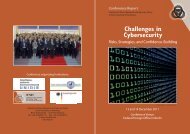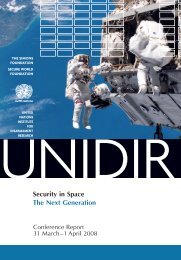General Assembly - UNIDIR
General Assembly - UNIDIR
General Assembly - UNIDIR
You also want an ePaper? Increase the reach of your titles
YUMPU automatically turns print PDFs into web optimized ePapers that Google loves.
A/56/359<br />
<strong>UNIDIR</strong> has focused on Africa, the Middle East, Latin<br />
America, North-East Asia, South Asia and Central<br />
Asia.<br />
1. Peacekeeping<br />
40. The third issue of Disarmament Forum in 2000<br />
was entitled “Peacekeeping: evolution or extinction?”.<br />
The articles were devoted to the following topics: the<br />
privatization of peacekeeping (Damien Lilly); a United<br />
Nations standing force (Steven Kinlock Pichat);<br />
peacekeeping and verification (Jane Boulden); keeping<br />
the peace in Africa (Eric Berman and Katie Sams);<br />
civil-military cooperation (Catriona Gourlay); and a<br />
special commentary from Ambassador Gambari. This<br />
issue was aimed at assisting the continuing debate on<br />
the evolution of peacekeeping and the United Nations.<br />
2. Latin America<br />
41. Illicit trafficking in firearms; prevention and<br />
combat in Rio de Janeiro, Brazil, by Péricles Gasparini<br />
Alves, is currently in the final stages of publication.<br />
The report, which contains material from field research<br />
and striking images, was released on the <strong>UNIDIR</strong> web<br />
site in July 2001; the hard-copy publication is to appear<br />
in the autumn of 2001.<br />
3. Asia<br />
42. The first year of the <strong>UNIDIR</strong> regional security<br />
fellowship programme was dedicated specifically to<br />
researchers from South Asia. Four researchers from<br />
South Asian countries arrived in Geneva in the autumn<br />
of 2000 and left in the spring of 2001. Each researcher<br />
came from a different country within the region and<br />
each from a different discipline: Shiva Hari Dahal<br />
(Nepal, human rights and human security expert), Haris<br />
Gazdar (Pakistan, economist), Soosaipallai<br />
Keethaponcalan (Sri Lanka, small arms and internal<br />
conflicts) and Padmaja S. Murthy (India, regional<br />
security specialist). The four fellows worked<br />
collectively on a single research paper on the impact of<br />
internal conflicts on South Asian regional security. The<br />
paper is to be published in autumn 2001.<br />
43. With the five Central Asian States currently<br />
negotiating an agreement on a Central Asian nuclearweapon-free<br />
zone, <strong>UNIDIR</strong> aims, at the appropriate<br />
time, to produce a study on the proposed zone,<br />
analysing its significance and its means of<br />
implementation.<br />
4. The Middle East<br />
44. The first edition of the <strong>UNIDIR</strong> handbook of<br />
definitions of arms control, disarmament and security<br />
terms (Coming to Terms with Security: a Lexicon for<br />
Arms Control, Disarmament and Confidence-Building)<br />
will appear in English and Arabic in an attempt to<br />
facilitate arms control aspects of the Middle East peace<br />
process. The book is intended for practitioners in the<br />
Middle East and as a useful training tool for young<br />
scholars and diplomats. The follow-up book on<br />
verification and confidence-building measures will also<br />
be aimed at the same audience.<br />
45. The second year of the <strong>UNIDIR</strong> regional<br />
fellowship programme is reserved for researchers from<br />
the Middle East and the programme will focus on the<br />
continuing Israeli-Palestinian conflict. The fellowships<br />
will be allocated on a competitive basis, taking due<br />
care to obtain national representation. Applications for<br />
the visiting research fellowships are being solicited and<br />
a decision on appointing four fellows is to be taken in<br />
September. The fellows will take up their posts in<br />
January 2002 for six months.<br />
C. Human security and disarmament<br />
46. Small arms and light weapons are the cause of<br />
death for millions of people in violent conflicts in<br />
every part of the world. For many years, <strong>UNIDIR</strong> has<br />
focused on the issue of small arms.<br />
1. Small arms in West Africa<br />
47. A project to support the implementation of the<br />
small arms moratorium by stimulating intellectual<br />
debates on national security policies and the control of<br />
small arms in selected West African States began in<br />
late 1998. Entitled “Peace-building and Practical<br />
Disarmament in West Africa: the role of civil society”;<br />
the project is based upon the premise that for the fight<br />
against small arms to be effective and sustainable in a<br />
violence-torn region like West Africa, the participation<br />
of civil society is a necessary condition. The project<br />
manager is Anatole Ayissi. Working with a broad range<br />
of local NGOs in Sierra Leone and Liberia, <strong>UNIDIR</strong><br />
has initiated and is currently assisting a sequence of<br />
research, debate and discussion on the notions of<br />
security and the role that preventing the spread of small<br />
arms could play in national and regional security.<br />
9








